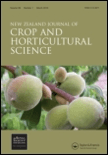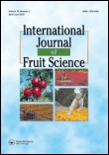
Erwerbs-Obstbau
metrics 2024
Empowering Agricultural Practices with Research.
Introduction
Erwerbs-Obstbau is a pivotal journal dedicated to the field of horticulture, focusing on research concerning the cultivation and production of fruit. Published by Springer in Germany, this journal plays a crucial role in disseminating innovative findings and advancing the knowledge base within the agricultural and biological sciences landscape. With an impact factor that places it in the Q3 category of horticultural journals, it ranks #68 out of 115 in its field according to Scopus, demonstrating its relevance and contribution to ongoing debates and advancements in horticulture practices. Researchers, professionals, and students benefit from the insights and developments shared in its pages, as the journal has been successfully converging data and insights since its inception in 1983, including continuous contributions from 1996 to the present. Although the journal currently does not offer Open Access, its comprehensive articles are invaluable for anyone invested in the science of fruit cultivation and production.
Metrics 2024
 0.30
0.30 1.20
1.20 1.30
1.30 22
22Metrics History
Rank 2024
Scopus
IF (Web Of Science)
JCI (Web Of Science)
Quartile History
Similar Journals

Molecular Horticulture
Transforming Agronomy with Cutting-Edge ResearchMolecular Horticulture is a prestigious journal published by SpringerNature, dedicated to advancing knowledge in the fields of Agronomy, Crop Science, Horticulture, and Molecular Biology. Based in the United Kingdom, this journal, with ISSN 2730-9401, is recognized for its high-quality, peer-reviewed research and has rapidly established itself within the academic community, achieving a remarkable Q1 ranking across its relevant categories as of 2023. With a strong focus on innovative research that explores the intersection of molecular biology and horticultural science, Molecular Horticulture provides valuable insights that are essential for researchers and professionals aiming to enhance crop production and sustainability practices. As part of the Scopus database, the journal ranks impressively within its fields, holding notable positions such as Rank #7 in Horticulture and Rank #42 in Agronomy and Crop Science. While currently published through traditional access models, the journal remains accessible to a wide audience of scientists, educators, and students eager to stay informed on the latest discoveries and trends in plant science.

Pesquisa Agropecuaria Tropical
Advancing agricultural knowledge for a sustainable future.pesquisa Agropecuaria Tropical is a premier Open Access journal dedicated to advancing the knowledge and practices within the field of agronomy and crop science. Since its inception in 1971, this peer-reviewed journal, published by the Universidade Federal de Goiás, has played a pivotal role in disseminating high-quality research from Brazil and beyond. Operating under an Open Access model, it ensures that scholarly articles are freely accessible, thereby fostering greater collaboration and innovation. With a Scopus ranking placing it in the 32nd percentile among its peers in agricultural and biological sciences, and a current classification in the Q3 category of agronomy and crop science, the journal serves as an essential resource for researchers, professionals, and students alike. As it continues its publication journey from 2010 to 2024, it remains committed to contributing valuable insights and advancements in the agricultural sector, ultimately influencing sustainable practices and food security.

NEW ZEALAND JOURNAL OF CROP AND HORTICULTURAL SCIENCE
Empowering Researchers in Plant Sciences and BeyondThe New Zealand Journal of Crop and Horticultural Science, published by Taylor & Francis Ltd, stands as a key resource in the fields of Agronomy and Horticulture, with a commendable impact factor reflecting its quality and influence in the scientific community. Since its inception in 1989, this journal has been committed to advancing our understanding of crop development and horticultural practices, catering not only to researchers and professionals but also to students eager to delve into the intricacies of plant sciences. With a Q3 ranking in both Agronomy and Crop Science and Horticulture as of 2023, the journal occupies a significant position within the agricultural and biological sciences domain, significantly contributing to the body of knowledge in these fields. The journal features original research, reviews, and technical notes that cover a wide range of topics, ensuring a comprehensive perspective on contemporary and emerging agricultural issues. For individuals interested in accessing cutting-edge research, the journal provides subscription-based access, further enhancing its scholarly contributions.

International Journal of Fruit Science
Pioneering studies that transform agronomy and ecology.International Journal of Fruit Science, published by TAYLOR & FRANCIS INC, is a preeminent platform for the dissemination of high-quality research in the fields of Agronomy, Horticulture, Ecology, and Plant Science. With an impressive track record since its inception in 2005 and ongoing convergence up to 2024, this journal serves as a vital resource for scholars and industry professionals alike. Renowned for its rigorous peer-review process and comprehensive publication of cutting-edge studies, it holds a distinguished position in multiple Scopus rankings, including a top 10 placement in Horticulture (Rank #8/115) and notable percentiles, reflecting its significant impact in the academic community. Researchers can delve into critical insights related to fruit cultivation, genetics, and sustainability, bolstered by its Q1 and Q2 quartile standings across various categories. Though the journal is not open access, it remains an essential read for those intent on advancing knowledge and practices within the rapidly evolving landscape of fruit science.

Horticulturae
Empowering Global Access to Horticultural Insights.Horticulturae, an esteemed open-access journal published by MDPI, is at the forefront of horticultural science, showcasing innovative research and advancements in the field since its inception in 2015. With its base in Switzerland, this journal operates under the ethos of global accessibility, allowing researchers, professionals, and students to share and disseminate critical findings without barriers. Horticulturae holds a distinguished Q1 ranking in Horticulture and Q2 in Plant Science, as reported in the 2023 categorizations, highlighting its impactful contributions to the scientific community. The journal features rigorous peer-reviewed articles covering a wide range of topics, including plant physiology, crop production, and sustainable practices, making it a vital resource for anyone engaged in gardening, agronomy, and environmental science. As it converges its focus from 2015 to 2024, Horticulturae not only aims to further academic discourse but also aligns with the growing need for research pertaining to biodiversity and sustainable agriculture, thus ensuring relevance in an ever-evolving field.

AMERICAN JOURNAL OF POTATO RESEARCH
Leading the Way in Agronomy and Crop ResearchAMERICAN JOURNAL OF POTATO RESEARCH is a prominent scholarly journal dedicated to the field of potato research, encompassing vital areas of Agronomy and Crop Science. Published by SPRINGER, this journal holds an impactful presence in the scientific community, as evidenced by its placement in the Q2 quartile of both Agronomy and Plant Science categories for 2023. With a Scopus rank of #145 out of 406 in Agricultural and Biological Sciences, it offers a significant platform for researchers, professionals, and students alike. Covering diverse topics from cultivation techniques to pest management, the journal aims to advance understanding and innovation in potato science, facilitating the sharing of cutting-edge research and fostering collaboration among scholars. Accessible to a global audience, the journal encourages the dissemination of knowledge through its open-access options. Since its inception in 1998, the AMERICAN JOURNAL OF POTATO RESEARCH has been committed to contributing valuable insights that drive the industry forward and support sustainable agricultural practices.

Horticultural Plant Journal
Pioneering Research for Modern HorticultureThe Horticultural Plant Journal, published by KEAI PUBLISHING LTD, stands at the forefront of horticultural research and innovation. With an ISSN of 2095-9885 and an E-ISSN of 2468-0141, this open access journal has been committed to disseminating significant findings in horticulture since 2015. As of 2023, it proudly holds prestigious Q1 rankings across multiple categories, including Biochemistry, Genetics and Molecular Biology, Ecology, and Plant Science, reflecting its impactful contributions to diverse scientific fields. Located in Beijing, China, the journal not only facilitates groundbreaking studies but also provides crucial insights into sustainability and environmental issues, being ranked in the top tiers of relevant disciplines. This makes it an invaluable resource for researchers, professionals, and students who aim to stay at the cutting edge of horticultural science, offering them the latest research that informs both academic understanding and practical application.

EUROPEAN JOURNAL OF HORTICULTURAL SCIENCE
Fostering dialogue on contemporary horticultural advancements.The European Journal of Horticultural Science, an esteemed publication of the International Society for Horticultural Science (ISHS), serves as a pivotal platform for advancing the field of horticulture since its inception in 2003. With its base in Germany, this journal occupies a significant position in the Q3 quartile of horticultural research, confidently ranked #60 out of 115 in the Agricultural and Biological Sciences category on Scopus, reflecting its relevance and impact within the scholarly community. The European Journal of Horticultural Science fosters open access to a wealth of research and insights, facilitating knowledge sharing among researchers, professionals, and students dedicated to the innovative and sustainable practices in horticultural science. As it embarks on a new chapter through its convergence years leading up to 2024, the journal aims to enhance the dialogue on contemporary horticultural challenges and advancements, making it an essential resource for those seeking to contribute to and learn from ongoing developments in this vital field.

POTATO RESEARCH
Advancing potato science for a sustainable future.POTATO RESEARCH is a prestigious journal dedicated to advancing the scientific understanding of potato cultivation and its wider implications in the fields of agronomy, crop science, and food science. Published by Springer in the Netherlands, this journal boasts an impressive impact factor and ranks in the Q2 category for both Agronomy and Crop Science, as well as Food Science in 2023, affirming its significant contribution to these disciplines. With over five decades of research converged from 1970 to 2024, POTATO RESEARCH serves as a vital platform for researchers, professionals, and students interested in the latest findings and innovations that affect potato production and processing. Although it is not an open-access journal, it remains a crucial resource for those dedicated to enhancing agricultural sustainability and food security. For inquiries or submission details, please refer to their office located at Van Godewijckstraat 30, 3311 GZ Dordrecht, Netherlands.

Legume Research
Connecting Science and Sustainability through LegumesLegume Research, published by the AGRICULTURAL RESEARCH COMMUNICATION CENTRE in India, is an essential peer-reviewed journal focusing on advancements in the field of agronomy, crop science, soil science, and plant science. With an ISSN of 0250-5371 and operating since 2008, this journal caters to researchers, agricultural professionals, and students interested in the critical role of legumes in sustainable agriculture and food security. It ranks within the third quartile (Q3) in several prominent categories, reflecting its contribution to the agricultural and biological sciences community—ranking #279 in Agronomy and Crop Science, #113 in Soil Science, and #376 in Plant Science based on Scopus metrics. Although not open access, Legume Research remains a vital resource for those seeking to enhance their knowledge and contribute novel research findings in the ever-evolving discipline of legume cultivation and utilization. With a clear objective to disseminate impactful research, this journal significantly contributes to the global understanding of legumes' ecological, economic, and nutritional importance.